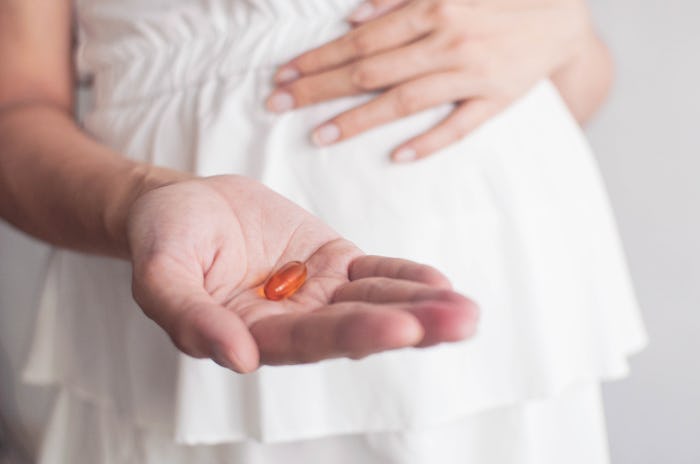Health

Here's How Long You Should Keep Taking Your Prenatal Vitamins After Giving Birth
Not everyone is in love with their prenatal vitamin. I have many friends who lament the fish-flavored aftertaste of their DHA vitamins, constipation from the iron-fortified variety, and general queasiness that can happen if you take them on an empty stomach. It's easy to understand why they would want to cool it with the horse pills as soon as their baby is born, but is that wise? Many doctors tell their patients to continue taking them even during the postpartum period, but how long should you take prenatal vitamins after you give birth?
Strangely enough, there is no universally adopted recommendation for the cessation of prenatal vitamins in the postpartum period. Not from the American College of Obstetrics and Gynecology (ACOG), not from the Royal College of Obstetrics and Gynaecology (RCOG) and not from the World Health Organization (WHO). While all agree that postnatal supplementation of vitamin D or iron may be required, there is no consensus on folate supplementation, which is the primary vitamin found in prenatal vitamins. However, WHO does suggest continuing with prenatal vitamins for as long as you breastfeed, and the ACOG, while they don't mandate the practice as WHO does, noted that some OB-GYNs recommend it.
The Cleveland Clinic suggested not only the vitamin D and DHA — the brain boosting nutrient found in fatty fish and seaweed — but also that prenatal vitamins continue to be taken by breastfeeding women. Sure, you might not want to get pregnant again soon, or ever, but it's still good for you if you're nursing. Personally, I haven't had a child in years, and I still take them, but this is also partly due to the fact that I do not and cannot take any birth control, so on the off chance that my barren body makes life, I want to be safe. I need a vitamin anyway because of a previous surgery that affects my ability to synthesize many nutrients, and it's easy to remember because Amazon subscribe and save never forgets.
There may be more to it than just recommendations, though. According to a study published in Nutrients, there are real, demonstrable benefits to maintaining your vitamin ritual for as long as you're breastfeeding. This isn't just folate, though. It's DHA, folate, vitamin D, and iodine. The study found that the continued supplementation through the breastfeeding period led to better visual acuity, brain development, and skills processing in the infant. Researchers theorized that this is because infants get all of their nutrition from their mothers during this period, and thus, the nutrition intake of their mother is reflected in the growth of the child.
How long should you take prenatal vitamins after you give birth if you're not planning on breastfeeding or getting pregnant right away? While you may require certain nutrients after giving birth, like iron and iodine, according to The Mayo Clinic, if you're not trying to get pregnant again, you can go ahead and cut out the prenatal vitamins. This is one of those cases where it can be too much of a good thing, according to The Mayo Clinic.
Prenatal vitamins serve a specific purpose in your body when you need to take them. If you're not mandated to take a specific vitamin, it's best you don't take it and instead find your nutrients via a food source and healthy, balanced diet, even if eating a healthy, balanced diet with a new baby seems absolutely impossible. Honestly, there are probably days where you're lucky if you remember to eat at all, am I right? It's all about doing your best for you and your baby. Talk to your OB-GYN, see what they say, but generally, prenatal vitamins are only for pre-pregnancy through lactation.
This article was originally published on